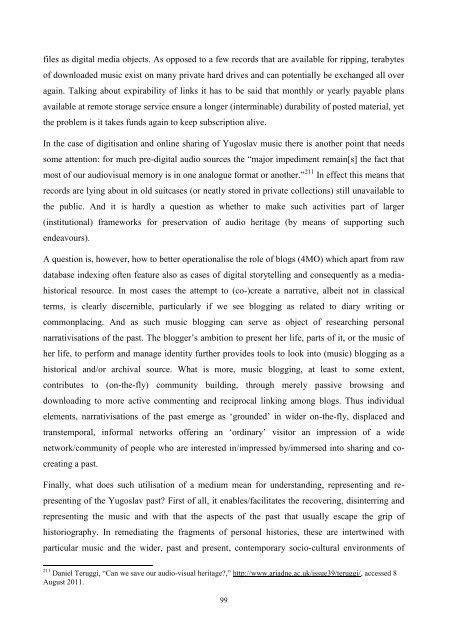UNIVERSITY OF NOVA GORICA GRADUATE SCHOOL ...
UNIVERSITY OF NOVA GORICA GRADUATE SCHOOL ...
UNIVERSITY OF NOVA GORICA GRADUATE SCHOOL ...
You also want an ePaper? Increase the reach of your titles
YUMPU automatically turns print PDFs into web optimized ePapers that Google loves.
files as digital media objects. As opposed to a few records that are available for ripping, terabytes<br />
of downloaded music exist on many private hard drives and can potentially be exchanged all over<br />
again. Talking about expirability of links it has to be said that monthly or yearly payable plans<br />
available at remote storage service ensure a longer (interminable) durability of posted material, yet<br />
the problem is it takes funds again to keep subscription alive.<br />
In the case of digitisation and online sharing of Yugoslav music there is another point that needs<br />
some attention: for much pre-digital audio sources the ―major impediment remain[s] the fact that<br />
most of our audiovisual memory is in one analogue format or another.‖ 211 In effect this means that<br />
records are lying about in old suitcases (or neatly stored in private collections) still unavailable to<br />
the public. And it is hardly a question as whether to make such activities part of larger<br />
(institutional) frameworks for preservation of audio heritage (by means of supporting such<br />
endeavours).<br />
A question is, however, how to better operationalise the role of blogs (4MO) which apart from raw<br />
database indexing often feature also as cases of digital storytelling and consequently as a mediahistorical<br />
resource. In most cases the attempt to (co-)create a narrative, albeit not in classical<br />
terms, is clearly discernible, particularly if we see blogging as related to diary writing or<br />
commonplacing. And as such music blogging can serve as object of researching personal<br />
narrativisations of the past. The blogger‘s ambition to present her life, parts of it, or the music of<br />
her life, to perform and manage identity further provides tools to look into (music) blogging as a<br />
historical and/or archival source. What is more, music blogging, at least to some extent,<br />
contributes to (on-the-fly) community building, through merely passive browsing and<br />
downloading to more active commenting and reciprocal linking among blogs. Thus individual<br />
elements, narrativisations of the past emerge as ‗grounded‘ in wider on-the-fly, displaced and<br />
transtemporal, informal networks offering an ‗ordinary‘ visitor an impression of a wide<br />
network/community of people who are interested in/impressed by/immersed into sharing and cocreating<br />
a past.<br />
Finally, what does such utilisation of a medium mean for understanding, representing and representing<br />
of the Yugoslav past? First of all, it enables/facilitates the recovering, disinterring and<br />
representing the music and with that the aspects of the past that usually escape the grip of<br />
historiography. In remediating the fragments of personal histories, these are intertwined with<br />
particular music and the wider, past and present, contemporary socio-cultural environments of<br />
211 Daniel Teruggi, ―Can we save our audio-visual heritage?,‖ http://www.ariadne.ac.uk/issue39/teruggi/, accessed 8<br />
August 2011.<br />
99

















